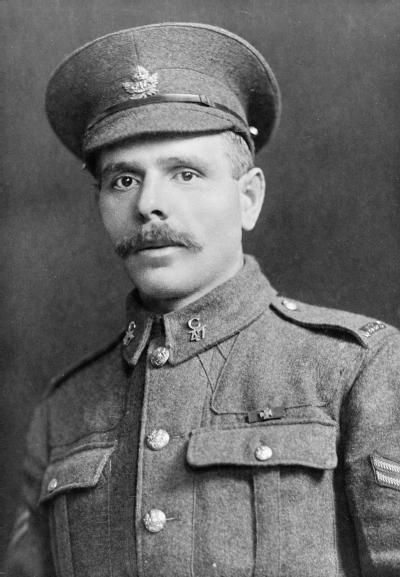Michael Luchkovich, teacher, politician, author (born 13 November 1892 in Shamokin, Pennsylvania; died 21 April 1973 in Edmonton, AB). In 1926, Michael Luchkovich became the first Ukrainian Canadian to be elected to Parliament. A member of the United Farmers of Alberta (UFA), he was re-elected in 1930 but defeated in 1935, when he ran as part of the Co-operative Commonwealth Federation (CCF). A staunch defender of minority rights in Canada, Luchkovich was an early advocate for multiculturalism. He later translated books from Ukrainian into English.

Early Life
Michael Luchkovich was born in 1892 in Shamokin, a coal mining town in Pennsylvania. His parents, Ephraim and Maria, had emigrated in 1887 from Austria-Hungary’s Lemko region. Luchkovich had three sisters and a brother.
In 1907, when Luchkovich was 15, his family moved to Winnipeg, Manitoba. He entered grade 11 at Manitoba College, which was part of the University of Manitoba. He graduated from the University of Manitoba in 1916 with a Bachelor of Arts in political science. The next year, he earned a first-class teaching certificate from the Calgary Normal School. (See also Normal Schools.) Like his sisters, who had also become teachers, Luchkovich taught at schools in Ukrainian communities in central Alberta.
He and his wife, Sophie (née Nikiforuk), were married on 26 January 1929. They had two sons, Myron and Dennis, and a daughter, Carol.
First Term in Parliament
In 1926, Luchkovich won the nomination to run as the United Farmers of Alberta (UFA) candidate in the federal riding of Vegreville, Alberta. In the election on 14 September 1926, Luchkovich faced only one opponent, Liberal Joseph S. McCallum. Luchkovich won by 728 votes. McCallum won the urban parts of the riding, but the farming communities voted for Luchkovich. He became the first Ukrainian Canadian to be elected to the Canadian Parliament. Luchkovich was one of 11 UFA members of Parliament.
In 1927, Bishop of Saskatchewan George Exton Lloyd formed the National Association of Canada. He led a movement opposing non-British immigrants, whom he called “dirty, ignorant, non-preferred, garlic-smelling continentals.” Luchkovich was highly critical of Lloyd and his ideas.
On 7 June 1928, in a long and passionate speech in the House of Commons, Luchkovich presented an argument that would not be settled until the point system for immigrant selection was established in 1967. (See Immigration to Canada.) He defended the practice of judging immigrants based on their intelligence and character and not on their race or religion. Luchkovich argued, “I contend that when a man comes to Canada with the main intention of building a home he has therein the fundamental qualities of good citizenship. If we are to have a policy of immigration, let us give the immigrant a chance to build for himself a home, and we can take it for granted that he will obey our laws and be amenable to our constitution.” He concluded, “I look forward to the time when all these racial misunderstandings will disappear and will recede into the dim and distant past as relics of a barbaric and savage age.”
Luchkovich’s speech was reported across Canada and the United States. Maclean’s magazine called him “one of the most talented orators in parliament.” In May 1929, Luchkovich delivered another speech in which he called Bishop Lloyd’s campaign “a crime against Christianity, against civilization and against Canadian unity.” Luchkovich had 4,000 copies of his speech published and sent to newspapers and groups across Canada.
Second Term in Parliament
Luchkovich was re-elected in the 1930 federal election. He again faced only one opponent, Liberal Charles Gordon, and defeated him by 1,010 votes. The Conservative Party, led by R.B. Bennett, won a large majority, with the Liberals forming the official opposition. Luchkovich was one of only nine UFA candidates elected.
In October 1931, the 27th Inter-Parliamentary Union welcomed 145 parliamentarians from 20 countries to Bucharest, Romania, to discuss international issues. Prime Minister R.B. Bennett chose Luchkovich to be the lone Canadian delegate to the conference.
Prior to the federal election on 14 October 1935, Luchkovich left the United Farmers of Alberta and was nominated to run as the Co-operative Commonwealth Federation (CCF) candidate for Vegreville. He was attacked by the Liberals, who said that in belonging to such a small party he could not properly represent the riding. Meanwhile, others criticized him for his support of Ukrainian nationalism in Europe. Unlike the previous two elections, the vote was split between five candidates. Luchkovich earned 3,628 votes to finish second to Social Credit’s William Hayhurst, who won 4,124.
Post-Political Career
Following his defeat, Luchkovich moved to Edmonton, where he bought and lived above a confectionery store. Following his election loss, he suffered from physical and mental health issues, including depression and vertigo.
By the early 1950s, he had again become active in the Ukrainian Canadian community. He translated books from Ukrainian to English. Important among them was his translation of Mykola Prychodko’s One of the Fifteen Million (1952) and Illia Kiriak’s Sons of the Soil (1959). In 1964, Luchkovich helped prepare a brief on behalf of the Edmonton Branch of the Ukrainian Canadian Committee to the Royal Commission on Bilingualism and Biculturalism. He argued that Canada was not a bicultural nation but rather a multicultural one.
In 1965, he published a memoir of his years in politics called A Ukrainian Canadian in Parliament. Luchkovich died in Edmonton on 21 April 1973.
Honours
In 1981, the Alberta Heritage Scholarship Fund created the Michael Luchkovich Scholarships for Career Development. It provides multiple scholarships a year to Albertans already in the workforce to enhance their education and training. By 1999, it had awarded more than $185 million to over 134,000 people.
In 1986, the Alberta Provincial Council of the Ukrainian Canadian Congress created the Michael Luchkovich Award. It is presented annually to an outstanding politician of Ukrainian origin.

 Share on Facebook
Share on Facebook Share on X
Share on X Share by Email
Share by Email Share on Google Classroom
Share on Google Classroom




